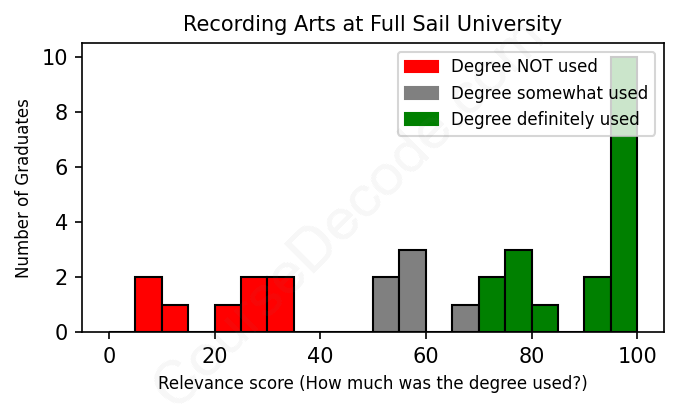
First, some facts. Of the Recording Arts graduates from Full Sail University we've analyzed , here's how many have used (or NOT used) their degree in their career:

These are estimates based on AI analysis of 32 LinkedIn profiles (see below).
The verdict? On par with the average. Overall, with an average relevance score of 67%, Recording Arts graduates from Full Sail University have about the same likelihood of finding work in this field as the average graduate across all fields:
And for comparison, here's the chart for all profiles we've looked at across all degrees.
Also, after graduating, only 15% of these graduates have pursued further education other than another Bachelor's degree (such as a Masters degree or other), compared to the average across all profiles of 35%. This suggests a Bachelors degree is enough for most Recording Arts graduates, and it's normal to look for work straight after graduation.
See the details:
|
Relevance score: 58% We think this person has gone into a career only somewhat relevant to their degree. We think this person has gone into a career only somewhat relevant to their degree.
DEGREE INFOGraduated in 2017 from Full Sail University with a Bachelors Degree in Recording Arts. Also pursued further education since (see below). JOB HISTORY SINCE GRADUATIONOvernight baker Dunkin' May 2017 - Jan 2019 Audio Engineer  Best Business Coach Mar 2019 - Jun 2019 Co-Owner/ Co-Founder & Sound Designer  RetroByte Games Jan 2017 - Jul 2022 Sound Designer  Replay soundz May 2017 - Jul 2022 Assistant Director  Pendant Productions Oct 2019 - Jul 2022 Manager  Walgreens Mar 2019 - Present Baker  Cake4Kids Mar 2024 - Present FURTHER DEGREES DONE SINCE GRADUATINGAssociate of Arts - AAAuguste Escoffier School of Culinary Arts 2020 - 2023 ABOUTAspiring pastry chef, baking my way through school and learning all that is required to accomplish my dream to build my own bakery. |
The top 10 most common jobs done by the graduates we've analyzed (ranked most common to least) are:
When we look at all the jobs that people with a Recording Arts degree from Full Sail University have landed, a few patterns really stick out. A majority of these roles are directly related to audio production, engineering, and sound design. Positions like audio engineer, freelance audio engineer, sound designer, and studio manager are super common, showcasing that many grads are applying the technical skills they learned in school right away. Internships at recording studios also pop up often, allowing newcomers to gain valuable hands-on experience straight out of college. All these roles definitely relate to what you’d study in a Recording Arts program, making them a good fit for the skills these graduates have acquired.
However, it's not all sunshine and roses. While many of the jobs are directly tied to the field, some graduates have ended up in positions that don’t really utilize their degree. For instance, roles like sales manager or customer service representative don’t require the technical skills or knowledge gained from Recording Arts coursework. Even jobs in fields like graphic design and general management can be a stretch from what you'd expect after studying audio production. So, while most grads are getting relevant positions in the recording arts, there are still cases where they find themselves in jobs that don’t quite align with their training. It’s a mixed bag, but overall, a fair number of them are making it work in the industry they set out to break into!
Here is a visual representation of the most common words in job titles for Recording Arts graduates (this is across all Recording Arts graduates we've analyzed, not just those who went to Full Sail University):

When you look at the career trajectories of graduates from the Recording Arts program at Full Sail University, you'll see a mix of paths. Many of these folks kick off their careers with internships, often at studios, which is pretty standard in the music and audio industry. For instance, graduates in the earlier years frequently started out as interns in well-known studios like Tree Sound Studios or PatchWerk Recording Studios. That on-the-job experience is essential for getting a foot in the door. It's common for these grads to evolve into roles like audio engineers or studio managers within a few years of graduating. If you fast forward five to ten years, some of these professionals are working at big names like PlayStation or even owning their own production companies, showing that many have successfully carved out solid careers in audio and music production.
However, not all paths are as rosy. While many graduates find rewarding jobs in relevant fields, others seem to veer off into areas that are pretty unrelated to their degree. For instance, there are individuals who started off in audio roles but shifted into customer service or technical jobs, or even retired from the industry altogether. Some graduates also end up in roles that don’t leverage their recording arts training at all, like sales or other non-audio-related positions. Overall, while there are many success stories in the recording arts field, it's clear that the journey can be pretty varied, with some graduates sticking to their passion and others exploring different career avenues altogether.
Honestly, the Bachelor’s degree in Recording Arts at Full Sail University can be pretty intense, especially if you’re passionate about music and sound. It’s not just about chilling in a studio and playing with cool tech; you’ll dive into a lot of technical stuff, from audio engineering to music production, and you need to be prepared to put in long hours working on projects. The pace is fast, given that Full Sail runs on a different schedule compared to traditional schools, so you could definitely feel the pressure at times. Overall, it can be a challenging degree, but if you're genuinely into it and ready to work hard, you’ll likely find it pretty rewarding too!
Most commonly, in the LinkedIn profiles we've looked at, it takes people 2 years to finish a Bachelor degree in Recording Arts.
When you check out the job history of these Full Sail University Recording Arts grads, it seems like there's a mixed bag in terms of money. Some of them quickly climbed up the ranks and landed solid roles, like a couple who became CEOs or senior designers at big companies like PlayStation and Warner Bros. Others started off with internships and freelance gigs, which can mean lower pay initially but might lead to better opportunities down the line. There are also quite a few who seem to have diversified into various roles, which is smart for job security but might not scream "high income." Overall, while some are probably making decent money now, others are still hustling to find their place in the industry. So, it's definitely a rollercoaster ride when it comes to earnings post-graduation!
Here is a visual representation of the most common words seen in the "about" section of LinkedIn profiles who have a Bachelor degree in Recording Arts (this is across all Recording Arts graduates we've analyzed, not just those who went to Full Sail University). This may or may not be useful:

Here are all colleges offering a Bachelor degree in Recording Arts (ordered by the average relevance score of their Recording Arts graduates, best to worst) where we have analyzed at least 10 of their graduates:
| College | Score | Count |
|---|---|---|
 Full Sail University Full Sail University
|
67 | 32 |